Background
Colson Whitehead was born in New York City on November 6, 1969, and grew up in Manhattan. Whitehead was one of four children. His parents ran an executive recruitment firm.


2017
Spreeweg 1, 10557 Berlin, Germany
Colson Whitehead waits to meet German President Frank-Walter Steinmeier at Schloss Bellevue presidential palace on October 23, 2017, in Berlin, Germany. Steinmeier met with Whitehead for a private conversation, part of a series of similar meetings Steinmeier has had with writers from a variety of countries since he took office.
2009
Colson Whitehead reads his work at The 2009 New Yorker Festival: Fiction Night at DGA on October 16, 2009, in New York City.
2009
Colson Whitehead reads his work at The 2009 New Yorker Festival: Fiction Night at DGA on October 16, 2009, in New York City.
2009
Colson Whitehead reads his work at The 2009 New Yorker Festival: Fiction Night at DGA on October 16, 2009, in New York City.
2011
Whitehead at the 2011 Brooklyn Book Festival.
2016
National Book Award for Fiction which Whitehead received in 2016.
2017
10 Lincoln Center Plaza, New York, NY 10023, United States
Colson Whitehead and his wife Julie Barer attend the 2017 Time 100 Gala at Jazz at Lincoln Center on April 25, 2017, in New York City.
2017
10 Lincoln Center Plaza, New York, NY 10023, United States
Colson Whitehead attends the 2017 Time 100 Gala at Jazz at Lincoln Center on April 25, 2017, in New York City.
2017
10 Lincoln Center Plaza, New York, NY 10023, United States
Astronomer Michael Gillon, Professor Guillem Anglada, and Colson Whitehead attend the 2017 Time 100 Gala at Jazz at Lincoln Center on April 25, 2017, in New York City.
2017
Spreeweg 1, 10557 Berlin, Germany
Colson Whitehead waits to meet German President Frank-Walter Steinmeier at Schloss Bellevue presidential palace on October 23, 2017, in Berlin, Germany. Steinmeier met with Whitehead for a private conversation, part of a series of similar meetings Steinmeier has had with writers from a variety of countries since he took office.
2017
10 Lincoln Center Plaza, New York, NY 10023, United States
Author Colson Whitehead attends the 2017 Time 100 Gala at Jazz at Lincoln Center on April 25, 2017, in New York City.
Colson Whitehead
Colson Whitehead
Colson Whitehead
Colson Whitehead
139 W 91st St, New York, NY 10024, United States
Trinity School in Manhattan where Colson Whitehead studied.
Harvard University, Cambridge, Massachusetts 02138, United States
Harvard University where Colson Whitehead received his Bachelor of Arts degree.
Dos Passos Prize which Whitehead received in 2012.
Andrew Carnegie Medal for Excellence in Fiction and Nonfiction which Whitehead received in 2017.
Pulitzer Prize for Fiction which Whitehead received in 2017.
Arthur C. Clarke Award which Whitehead received in 2017.



















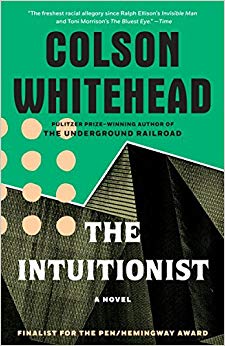
(Verticality, architectural and social, is the lofty idea ...)
Verticality, architectural and social, is the lofty idea at the heart of Colson Whitehead's first novel that takes place in an unnamed high-rise city that combines 21st-century engineering feats with 19th-century pork-barrel politics. Elevators are the technological expression of the vertical ideal, and Lila Mae Watson, the city's first black female elevator inspector, is its embattled token of upward mobility. When Number Eleven of the newly completed Fanny Briggs Memorial Building goes into deadly free-fall just hours after Lila Mae has signed off on it, using the controversial "Intuitionist" method of ascertaining elevator safety, both Intuitionists and Empiricists recognize the set-up, but may be willing to let Lila Mae take the fall in an election year.
http://www.amazon.com/gp/product/0385493002/?tag=2022091-20
1999
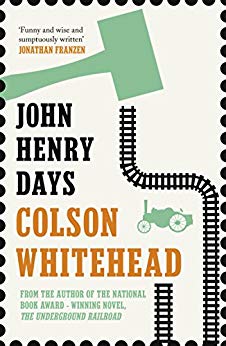
(John Henry Days is a novel of extraordinary scope and myt...)
John Henry Days is a novel of extraordinary scope and mythic power. Building the railways that made America, John Henry died with a hammer in his hand moments after competing against a steam drill in a battle of endurance. The story of his death made him a legend. Over a century later, J. Sutter, a freelance journalist, and accomplished expense account abuser went to West Virginia to cover the launch of a new postage stamp at the first John Henry Days festival.
http://www.amazon.com/gp/product/B00I7JYNEU/?tag=2022091-20
2001
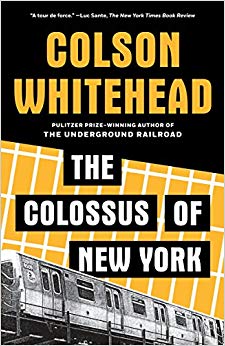
(A masterful evocation of the city that never sleeps, The ...)
A masterful evocation of the city that never sleeps, The Colossus of New York captures the city’s inner and outer landscapes in a series of vignettes, meditations, and personal memories. Colson Whitehead conveys with almost uncanny immediacy the feelings and thoughts of longtime residents and of newcomers who dream of making it their home; of those who have conquered its challenges and of those who struggle against its cruelties.
http://www.amazon.com/gp/product/1400031249/?tag=2022091-20
2003

(Apex Hides the Hurt is a new, brisk, comic tour de force ...)
Apex Hides the Hurt is a new, brisk, comic tour de force about identity, history, and the adhesive bandage industry. When the citizens of Winthrop needed a new name for their town, they did what anyone would do - they hired a consultant. The protagonist of Apex Hides the Hurt is a nomenclature consultant. If you want just the right name for your new product, whether it be automobile or antidepressant, sneaker or spoon, he’s the man to get the job done.
http://www.amazon.com/gp/product/B01K14JAYQ/?tag=2022091-20
2006
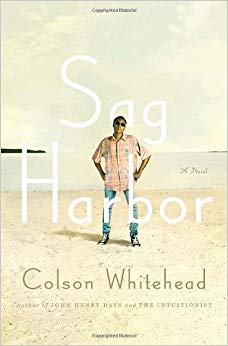
(The year is 1985. Benji Cooper is one of the only black s...)
The year is 1985. Benji Cooper is one of the only black students at an elite prep school in Manhattan. He spends his falls and winters going to roller-disco bar mitzvahs, playing too much Dungeons and Dragons, and trying to catch glimpses of nudity on late-night cable TV. After a tragic mishap on his first day of high school, when Benji reveals his deep enthusiasm for the horror movie magazine Fangoria, his social doom is sealed for the next four years.
http://www.amazon.com/gp/product/B01K3I1CDM/?tag=2022091-20
2009
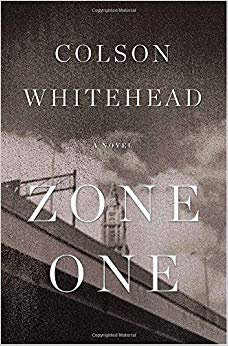
(In this wry take on the post-apocalyptic horror novel, a ...)
In this wry take on the post-apocalyptic horror novel, a pandemic has devastated the planet. The plague has sorted humanity into two types: the uninfected and the infected, the living and the living dead. Now the plague is receding, and Americans are busy rebuilding civilization under orders from the provisional government based in Buffalo. Their top mission: the resettlement of Manhattan.
http://www.amazon.com/gp/product/B01N1WAKDW/?tag=2022091-20
2011
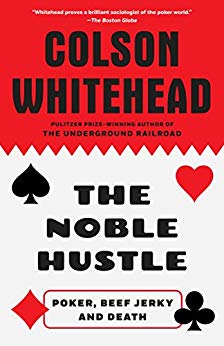
(In 2011, Grantland magazine gave bestselling novelist Col...)
In 2011, Grantland magazine gave bestselling novelist Colson Whitehead $10,000 to play at the World Series of Poker in Las Vegas. It was the assignment of a lifetime, except for one hitch - he’d never played in a casino tournament before. With just six weeks to train, our humble narrator took the Greyhound to Atlantic City to learn the ways of high-stakes Texas Hold’em.
http://www.amazon.com/gp/product/B00GL3OJQQ/?tag=2022091-20
2014
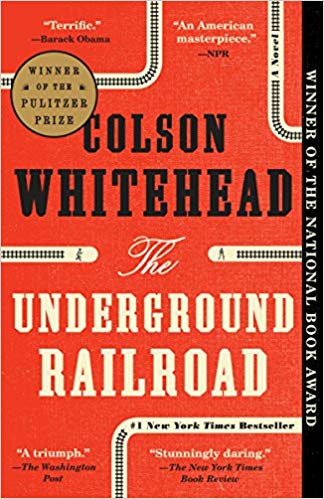
(Cora is a slave on a cotton plantation in Georgia. Life i...)
Cora is a slave on a cotton plantation in Georgia. Life is hell for all the slaves, but especially bad for Cora; an outcast even among her fellow Africans, she is coming into womanhood where even greater pain awaits. When Caesar, a recent arrival from Virginia, tells her about the Underground Railroad, they decide to take a terrifying risk and escape. Matters do not go as planned - Cora kills a young white boy who tries to capture her. Though they manage to find a station and head north, they are being hunted.
http://www.amazon.com/gp/product/0345804325/?tag=2022091-20
2016
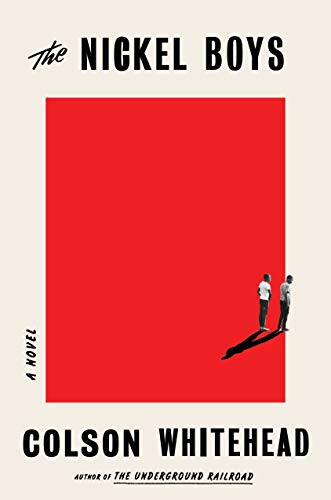
(As the Civil Rights movement begins to reach the black en...)
As the Civil Rights movement begins to reach the black enclave of Frenchtown in segregated Tallahassee, Elwood Curtis takes the words of Dr. Martin Luther King to heart: He is "as good as anyone." Abandoned by his parents, but kept on the straight and narrow by his grandmother, Elwood is about to enroll in the local black college. But for a black boy in the Jim Crow South of the early 1960s, one innocent mistake is enough to destroy the future.
https://www.amazon.com/gp/product/B07J489X7H/?tag=2022091-20
2019
Colson Whitehead was born in New York City on November 6, 1969, and grew up in Manhattan. Whitehead was one of four children. His parents ran an executive recruitment firm.
Colson Whitehead attended Trinity School in Manhattan, New York. Until he went to Harvard he had done everything his parents expected of him. They expected him to go into a profession. At Harvard, he changed. He started to rebel in this passive-aggressive way, by sleeping in late and everything like that. He took classes in the theatre department and in the African American studies department. He wasn’t a particularly ambitious student, he played cards, poker, and bridge. At Harvard University Whitehead studied English and Comparative Literature and graduated in 1991 with a Bachelor of Arts degree. There he became friends with poet Kevin Young.
After graduating from university, Whitehead worked at The Village Voice as music, book, and television critic. While working at the Voice, Whitehead wrote a plotless novel about a Gary Colemanesque child star called The Return of the Spook. Still unpublished, it was a learning experience, a process that opened a path that allowed other works to flow out of him. He crafted The Intuitionist as an antithesis to that. This book concerned intrigue in the Department of Elevator Inspectors.
He left the paper in the late nineties and has since taught at several universities: Columbia University, the University of Houston in Texas, Princeton in New Jersey, Brooklyn College, Hunter College, New York University, Wesleyan University, and been a Writer-in-Residence at Vassar College, the University of Richmond, and the University of Wyoming.
In the spring of 2015, he joined The New York Times Magazine to write a column on language.
To date, Whitehead has published books of a variety of fictional genres including horror, social realism, absurdist fiction, and fabulist fiction. His novels include John Henry Days (2001), Apex Hides the Hurt (2006), Sag Harbor (2009), Zone One (2011), and The Underground Railroad (2016). The last novel was written because Whitehead felt a duty to his ancestors to tell a story that reveals the truth about slavery and the Jim Crow south. The book is adopted into a limited drama series written and directed by Barry Jenkins.
His two works of nonfiction include a collection of essays, The Colossus of New York (2003) and a memoir, The Noble Hustle: Poker, Beef Jerky & Death (2011). His new book is called The Nickel Boys.
Colson Whitehead's book Sag Harbor was a finalist for the PEN/Faulkner Award and the Hurston/Wright Legacy Award. Zone One (2011) was a New York Times Bestseller.
GQ called Colson Whitehead's The Underground Railroad one of the novels of the millennium. The Underground Railroad was a selection of Oprah's Book Club 2.0 and was also chosen by President Barack Obama as one of five books on his summer vacation reading list.
He has received a MacArthur Fellowship, A Guggenheim Fellowship, and a fellowship at the Cullman Center for Scholars and Writers.
In 2017 he was featured in the Time 100 list of the most influential people in the world.
(Verticality, architectural and social, is the lofty idea ...)
1999(A masterful evocation of the city that never sleeps, The ...)
2003(As the Civil Rights movement begins to reach the black en...)
2019(In 2011, Grantland magazine gave bestselling novelist Col...)
2014(Apex Hides the Hurt is a new, brisk, comic tour de force ...)
2006(In this wry take on the post-apocalyptic horror novel, a ...)
2011(John Henry Days is a novel of extraordinary scope and myt...)
2001(Cora is a slave on a cotton plantation in Georgia. Life i...)
2016(The year is 1985. Benji Cooper is one of the only black s...)
2009Colson Whitehead said about The American Declaration of Independence: "The Declaration of Independence is that sacred American text so full of meaning and purpose and yet quite empty if you examine it and pull it apart because the words "All Men" exclude a vast number of citizens."
Colson Whitehead's parents were less than delighted when he announced a desire to become a writer. Among his chief motivations for becoming a writer was to avoid people.
Many of his early books started from "what if" questions.
Colson Whitehead is concerned about the continuance of racial issues in the present day.
Quotations:
"It is a failure that guides evolution; perfection provides no incentive for improvement, and nothing is perfect."
"As time went on, we learned to arm ourselves in our different ways. Some of us with real guns, some of us with more ephemeral weapons, an idea or improbable plan or some sort of formulation about how best to move through the world. An idea that will let us be. Protect us and keep us safe. But a weapon nonetheless."
"Most people say, "Show, don't tell," but I stand by Show and Tell, because when writers put their work out into the world, they're like kids bringing their broken unicorns and chewed-up teddy bears into class in the sad hope that someone else will love them as much as they do."
"The thing I love about New York is getting lost but not worrying, just wandering and wandering, knowing that there's always a subway only ten blocks away in any direction. There's always a new neighborhood to discover, a new place to lose your bearings in, and yet however alien it seems you can escape. You can always get a cab. All of life's problems can be solved by hailing a cab."
"Don’t go searching for a subject, let your subject find you. You can’t rush inspiration. … Once your subject finds you, it’s like falling in love. It will be your constant companion. Shadowing you, peeping in your windows, calling you at all hours to leave messages like, Only you understand me."
"A monster is a person who has stopped pretending."
"As I get older and write more books I'm definitely allowing the humorous side of my personality more rein in my work."
"What isn't said is as important as what is said."
"Memory is the most malicious cutter of all, preserving, recasting, panning in slow motion across the awful bits so that we retain every detail."
"Sanctimony and self-regard are as American as smallpox blankets and supersize meals."
"I think the world's big enough for all kinds of zombies. You can have yours and I can have mine. I think by going with slow zombies I maybe have been asserting my own kind of zombie snobbery, but I don't begrudge the youngsters their tackling, running, jumping zombies."
"My daughter is a good kid. Her presence in my life has made me a better person and improved my work and happiness."
Colson Whitehead values his downtime. He usually takes a year or a year and a half between stuff, whether it’s staring off into space or bingeing on a TV show or a video game for a month.
The first book manuscript he wrote was rejected by 25 publishing houses.
Physical Characteristics: Whitehead is tall, fit and has long dreads.
Quotes from others about the person
Novelist John Updike, reviewing The Intuitionist in The New Yorker, called Whitehead "ambitious," "scintillating," and "strikingly original," adding, "The young African-American writer to watch may well be a thirty-one-year-old Harvard graduate with the vivid name of Colson Whitehead."
Colson Whitehead's first wife was Natasha Stovall. They have a daughter. Now he is married to Julie Barer. They have one daughter, Madeline Whitehead.
Arch Whitehead had his own business research company, Arch S. Whitehead Associates, Inc. Along the way, he helped many minority business entrepreneurs. His executive search clients included Yale University, Columbia University, Revlon, Bristol Myers Squibb, Pepsi Cola, R. J. Reynolds Tobacco Company and many others. He died on March 10, 2009.
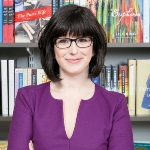
Julie Barer is a Partner at The Book Group, a literary agency she founded in 2015 alongside Faye Bender, Brettne Bloom, and Elisabeth Weed. Julie has a long and varied list of clients, but she concentrates primarily on long and short literary fiction. Julie has represented work that has appeared in The Atlantic Monthly, Harper's, The Wall Street Journal, The New York Times, The New Yorker, Best American Short Stories, Tin House, and others.
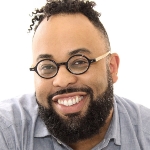
Kevin Lowell Young is an American poet and teacher of poetry. From 2017, Young is a poetry editor of The New Yorker.
